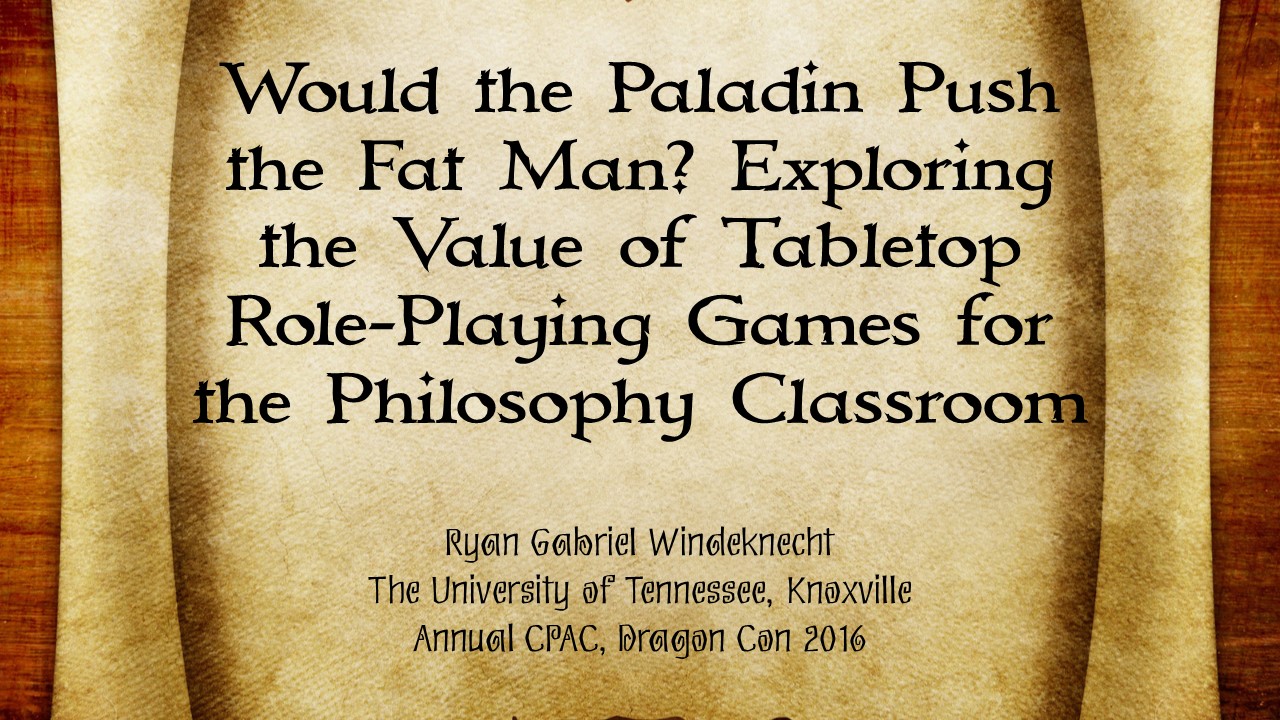
Hey all!
Longtime lurker, first-time poster. Shameless plug here: anyone going to Dragon Con this weekend, I’ll be giving a demo on using tabletop RPGs to teach philosophy. Specifically, I’ll be using a stripped-down DW to discuss the classic Trolley Problem thought experiment. If this sounds like something you’d be interested in, I’d love to see you there.
Thanks!
Friday, 4:00pm; RPGs and Philosophical Pedagogy; Tabletop Gaming Track; Westin, Augusta 1-2.
An interactive workshop demonstrating how tabletop RPGs can be used for experiential education.
Moderator: Daniel Amrhein (Journey into Awesome).
Presentation: Ryan Gabriel Windeknecht (University of Tennessee, Knoxville), “Would the Paladin Push the Fat Man? Exploring the Value of Tabletop Role-Playing Games for the Philosophy Classroom.”

Please post a video of it!
Hadn’t thought of that. I’ll see what I can do!
yes please, sounds super interesting.
It does sound interesting, although I see a disconnect between philosophical thought-experiments and roleplaying. Specifically, in the thought experiments your choices are often circumscribed (you can either do A or B), and the outcomes from that one choice are fixed and known in advance.
So, in the classic trolley problem, your options are to do nothing, thus letting the trolley run over 5 people (or however many), or push the fat man onto the trolley track, which will kill the fat man but you somehow know it will derail the trolley and save the people.
In a good roleplaying game like Dungeon World though, your players can try to do things their own way… they can choose to sacrifice themselves to derail the trolley. Or they can attempt to derail or stop the trolley in such a way that doesn’t automatically result in their death. Or perhaps they can get the people further down the trolley track to move out of the way.
And even if they choose to shove the fat man onto the tracks, they have no way of knowing whether that will automatically save the folks down the line, so the moral choice they’re making is quite different from the one being made in the philosophy thought-experiment.
We played a session earlier this year (not Dungeon World) where we encountered a trolley-problem-esque situation, where a magical gate required weekly sacrifices of unwilling victims to remain shut – otherwise it would open and let out a world-devouring horror. We came up with a lateral solution where we fed the gate to some magic-eating vines we’d previously encountered. Of course it all went horribly wrong and there was screaming and fleeing and death and we ended up facing off against the world-devouring horror anyway, albeit in unusual circumstances. We didn’t just accept the front-and-centre options offered by the situation at face value, though.
well technically you did decide to not feed the gate.
Robert, you’ve squarely put your finger on a tension that I’ve definitely been wrestling with during my classes. A well-crafted thought experiment is constrained and aimed at getting to the heart of a philosophical problem. A well-crafted monster encounter is unconstrained, and aimed at encouraging creative thinking and ultimately fun. For better or worse, as I’m teaching philosophy, my aims align more with the thought experiment than the monster encounter. However, I remain convinced that, although constrained (which is what I understood your point to be), the thought experiment also encourages creative thinking and fun (which is part of the reason I started using them), just in a different way.
There is a related point about my aims aligning more with the thought experiment, and I think it goes to Chris’s point as well. With a monster encounter, we are mostly concerned with actions. The GM sets the stage, asks “What do you do?” and then you have your character do something. With a thought experiment, we are mostly concerned with reasons for actions. The philosopher sets the stage, asks “What would you do?” and, after you tell her, she asks “Why?” So if the utilitarian, good-aligned thief (in my games, players get an ethical theory along with their alignment) decides to feed innocents to the hell-gate (to borrow your awesome-sounding, trolley-problem-esque encounter), I ask why. And if the Kantian, lawful-aligned paladin decides not to feed innocents to the hell-gate, I ask why not. This might be more meta-gaming than gaming, but, again, for better or worse, I’m teaching philosophy. I just hope that it’s more engaging than a lecture about utilitarianism, Kant, and the trolley problem!
Ryan Windeknecht It definitely sounds more engaging than just a lecture! I imagine it could spark some fascinating post-game discussions and debates too.
I also love the idea of alignments like Utilitarian-Good 🙂
I’m definitely interested in seeing a video of the presentation if it’s possible to arrange.
Quick update. The session went better than I ever could’ve guessed. Had around 100 people in attendance and they were awesome. Great questions. Great discussion. My wife recorded some video, so stay tuned…